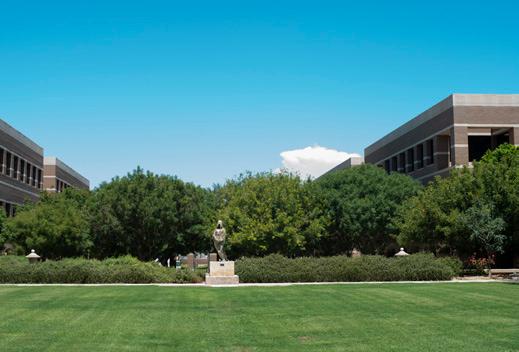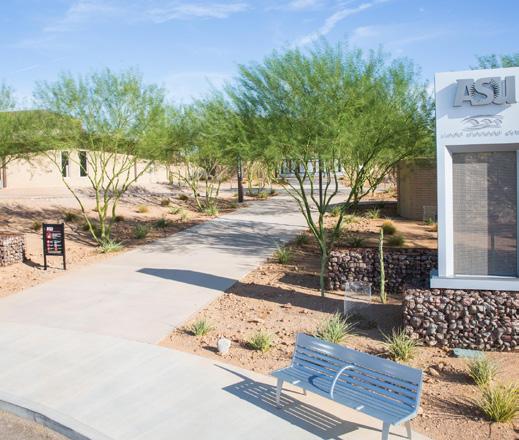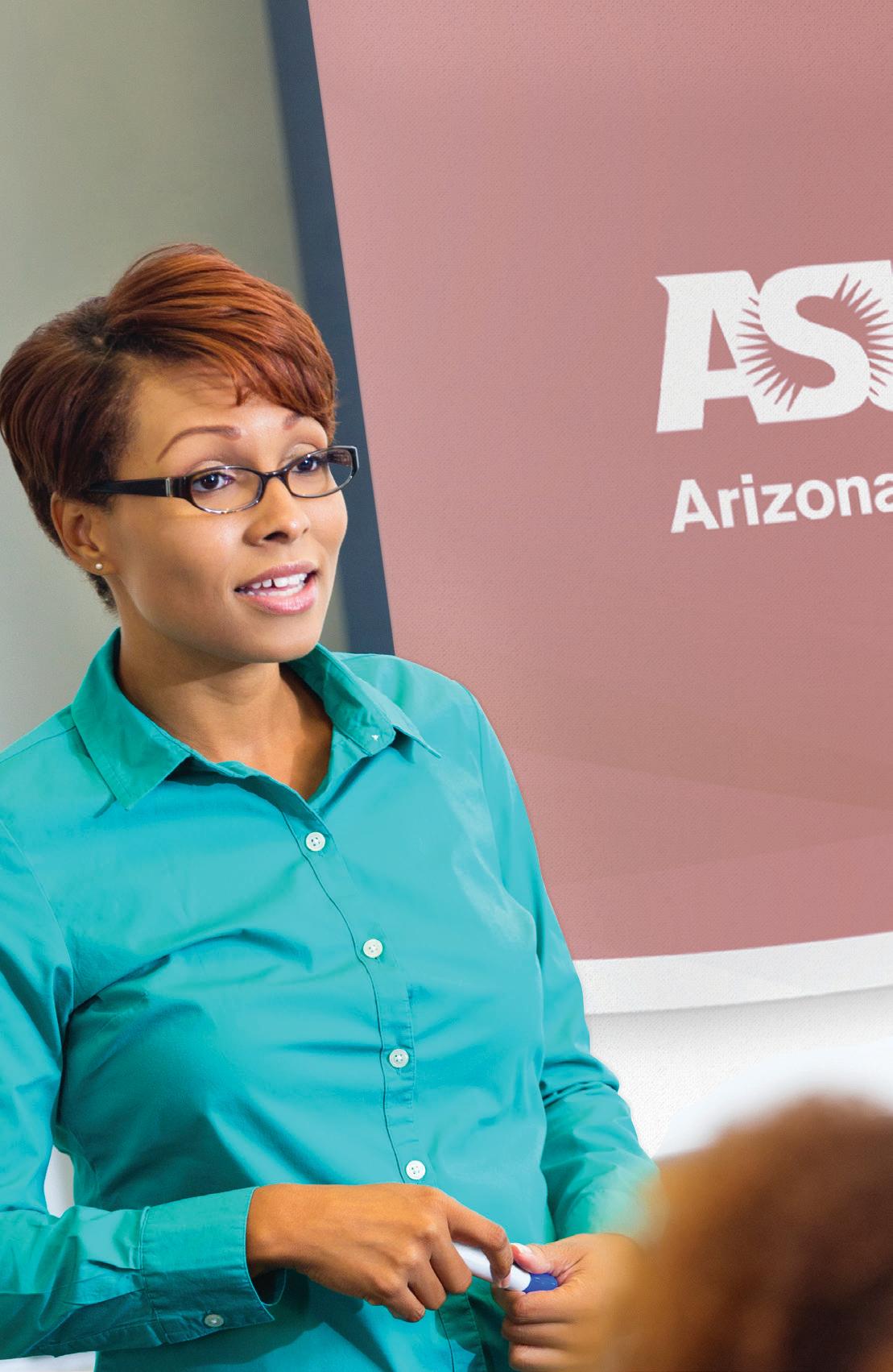
8 minute read
Self- Study Report to the Commission on Collegiate Nursing Education
Arizona State University
Edson College of Nursing and Health Innovation
Advertisement
Introduction And Overview
Arizona State University
Established in Tempe in 1885 by an act of the Thirteenth Territorial Legislature, Arizona State University (ASU) was initially formed as a teachers’ college. The core obligation of the institution was to train public school teachers and provide instruction in agriculture and the mechanical arts. In rapid succession Tempe State Teachers College became Arizona State Teachers College and, in 1945, Arizona State College. By 1958, the college performed all the functions of a university and received authorization by an act of the governor to become Arizona State University (ASU). The development of new academic programs and library holdings, the conferral of doctoral degrees, beginning in 1961, and the tremendous growth of the university throughout the next four decades led the Carnegie Foundation to grant ASU Research I status in 1994. Today, ASU spans the lands of twenty-three Native Nations that have inhabited this land for centuries. ASU’s four campuses are located in the Salt River Valley on ancestral territories of Indigenous peoples, including the Akimel O’odham (Pima) and Pee Posh (Maricopa) Indian Communities, whose care and keeping of these lands allows us to be here today.
ASU is the largest public university in the US, boasting more than 140,000 students across campuses in Tempe, Downtown Phoenix, ASU West Campus, the Polytechnic Campus, and Lake Havasu. ASU is part of the state university system governed by the Arizona Board of Regents (ABOR) that includes the University of Arizona in Tucson and Northern Arizona University in Flagstaff. ASU is accredited by the Higher Learning Commission of the North Central Association of Colleges and Schools. The most recent accreditation visit to the University was in 2023 and ASU received 10- year re-accreditation ASU HLC Accreditation Letter 2023
On July 1, 2002, Michael M. Crow became the sixteenth president of ASU. President Crow has spearheaded ASU’s rapid and groundbreaking transformative evolution into one of America’s best public metropolitan research universities. As a model “New American University”, ASU simultaneously demonstrates comprehensive excellence, inclusivity representative of the ethnic and socioeconomic diversity of the United States, and consequential societal impact. ASU is guided by its Charter, mission, and goals ASU Charter, Mission, Goals. Nine design aspirations provide the impetus for ASU’s ongoing evolution for innovative ways to demonstrate excellence, access, and impact research ASU Toward 2028 and Beyond ASU is one of the fastest-growing research enterprises in the U.S., nearly doubling its research expenditures ($797M in 2022) over the last ten years and ranks No. 6 in the U.S for total research expenditures among institutions without a medical school.
Edson College of Nursing & Health Innovation
In 1957, the Arizona Board of Regents authorized the College of Liberal Arts and Sciences to establish a School of Nursing at ASU. The first academic program to be offered was that leading to a Bachelor of Science in Nursing (BSN). The program was granted full accreditation by the National League for Nursing (NLN) in 1961. In 1964, the ABOR approved a change for the "school" to become a college and in 1969 endorsed the establishment of a master's program. The MS Nursing degree began with two specialty areas of concentration (Community Mental Health/Psychiatric Nursing and Family/Child Nursing) and graduated its first five students in 1971. Demand for ASU’s graduates and need for preparing additional nursing faculty in Arizona led to the initiation of the college’s Doctor of Nursing Science program in 2005, which later was converted to a PhD in Nursing and Healthcare Innovation (2007). The MS nurse practitioner program began to transition to a DNP program in 2007 and graduated the first post-m aster DNP students in December 2008 and the first BSN to DNP students in May 2013. The college name was changed to The College of Nursing and Health Innovation in 2005. After receiving a $25 million gift from the Edson family, the name was changed to the Edson College of Nursing and Health Innovation in
2019. The college prepares innovative, evidence-based healthcare providers and health promotion professionals, educators, leaders, and researchers to optimize health in a culturally diverse global community. From a program that graduated only six people in 1960, Edson College has grown to more 16,000 graduates.
In 2018, Judith Karshmer, PhD, RN, PMHCNS-BC, FAAN joined the college as the 7th dean. Under her leadership the college has grown in stature, establishing a Master’s Entry to Nursing Program (MEPN), the PhD/DNP Dual Degree Option and expanded to campus sites at ASU Lake Havasu, the West Campus, and the Polytechnic Campus. During her tenure as dean the college has received funding to support nursing workforce needs including HRSA, U.S Department of Labor, Arizona Department of Health Services, Rural Health Professions Program, and March of Dimes. The Edson research portfolio has increased its research portfolio an average of 22% year-over-year (FY 20192023) and partnerships with local and global partners have grown expansively.
Undergraduate Nursing Degree
The BSN program prepares individuals for entry-level professional practice and provides a foundation for leadership roles and graduate study. The overall structure of the BSN program is an upper-division nursing major built upon liberal studies. All students must meet the university general education requirements by taking courses to meet the designated credit requirements of humanities, literature, and the arts. The Bachelor of Science in Nursing prepares students to think critically, make decisions and function effectively in their individual and team surroundings. Upon graduation, students are eligible to sit for the national licensing examination for registered nurses (NCLEX-RN®). The BSN degree also prepares the graduate for entrance into graduate study in nursing at the master's degree level, BSN to DNP and BSN to PhD programs.
BSN Pathways
Pre-licensure
Traditional Program: Students take prerequisite course work in the first four semesters and then advance to the upper-division clinical nursing program, which takes four semesters to complete. These last four semesters may be completed in a year-round program in 16 months or an academic year program in 24 months.
Accelerated Program: Students who have earned a bachelor’s degree in a discipline other than nursing or have completed all prerequisites are eligible for the accelerated BSN program. Students must meet ASU General Studies’ requirements, selected nursing prerequisites, and complete a 12-month upper division clinical nursing program.
Post-licensure
RN-BSN Program: This program is fully remote. Students in this program have graduated from a regionally accredited associates degree program and hold an active, unencumbered RN license. The curriculum includes clinical practice experiences focusing on health promotion, community health, and leadership, including a capstone project to design, deliver and evaluate an evidencebased nursing practice change project.
Concurrent Enrollment Program (CEP Program): This pathway permits qualified nursing students from any regionally accredited community college to earn their associate degree in nursing while simultaneously pursuing their Bachelor of Science in Nursing (BSN) degree from ASU. The curricula are parallel to the courses offered in the RN-BSN program, and are leveled, and paced to better support student success in both the pre-licensure partner program and the ASU CEP program. This program is offered through fully remote delivery.
Eastern Arizona College (CEP at EAC (Hybrid) Program): Implemented in 2012, this program follows the same curriculum as the CEP program and provides the opportunity for students attending a rural community college to simultaneously complete their BSN in their community. Supporting EAC and Edson faculty recommendations and student preference, the CEP-EAC is delivered in a hybrid format. Faculty teaching BSN courses are employed by Edson College.
Graduate Nursing Degrees
Pre-licensure
Master’s Entry Program (MEPN). The MEPN provides a pathway for students holding a baccalaureate degree in another discipline and have completed the prerequisites to become registered nurses. This pathway is designed to build on a student's previous education experiences and is completed in four semesters.
Post-licensure
MS, Nursing: This is a fully remote program that focuses on the content aligned with the advanced nursing knowledge. The curriculum offers a pathway for transition to the PhD in Nursing & Healthcare Innovation or the Doctor of Nursing Practice programs depending on the student’s career goals. The curriculum includes clinical learning experiences in both direct and indirect care roles and a culminating Applied Project. Clinical learning experiences across two courses (4 credits, 180 hours) include 1:1 work with a preceptor who is educationally and experientially prepared to assist the student to apply learning at a clinical site. Students must have an earned BSN from a regionally accredited college or university and have an active, unencumbered RN license throughout the duration of the program.
MS, Nursing Education (NED): This program is designed to prepare nurses as educators to meet the demands of the changing health care and nursing education environment. This curriculum also offers a pathway for transition to the PhD in Nursing & Healthcare Innovation or the Doctor of Nursing Practice programs depending on the student’s career goals. The program is delivered in a fully remote format with content aligned with the advanced nursing knowledge that includes direct patient care, advanced nursing theory, evidence-based practice, and research, as well as the science of education and pedagogy.
Doctoral
Doctor of Nursing Practice (DNP): The DNP at ASU is focused on improving healthcare through facilitating a culture of best practice and providing the additional skills necessary to develop the advanced practice nursing leader for the future. Graduates of this program are able to facilitate the application and integration of research into clinical practice through evidence-based practice and innovative approaches across multiple settings to improve healthcare outcomes of individuals, populations, and health systems.
Nurse Practitioner Tracks include: (1) Adult-Gerontology Nurse Practitioner (AGNP), (2) Family Psychiatric Mental Health Nurse Practitioner (PMHNP), (3) Family Nurse Practitioner (FNP), (4) Women’s Health Nurse Practitioner (WHNP, (5) Pediatric Nurse Practitioner (PNP), (6) Acute Care Pediatric Nurse Practitioner (ACPNP).
Post Graduate Advanced Nursing Practice DNP Track is designed specifically for MSprepared advanced practice nurses seeking a Doctor of Nursing Practice degree. Courses are designed for clinical experts and enable students to meet the outcomes competencies outlined in the DNP Essentials.
Post Graduate Innovation Leadership Track is designed to prepare the graduate as an innovative leader, harnessing design thinking and leveraging innovation theory, complexity science, leadership, and the application of current evidence to advance health system outcomes.
The DNP Program courses are delivered in a hybrid format that includes remote learning experiences and in person immersions. Two to three on-campus immersions are required each semester and coursework is presented in both synchronous and asynchronous formats. Supervised clinical experiences designed to meet the requirements of a particular track are woven throughout the programs of study.
APRN Certificates: Seven Graduate level certificates are available for certified NPs with Masters or Doctoral degrees who wish to add an additional NP specialty. Certificates are available for 1) AGNP, 2) FNP 3) PMHNP, 4) PNP, 5) ACPNP, and 6) WHNP.
PhD in Nursing & Healthcare Innovation
The PhD degree in Nursing & Healthcare Innovation is designed for scholars who wish to pursue careers as researchers to advance nursing science, promote innovative delivery models, expand use-inspired research with a community focus, or focus on health policy, pedagogy, and interprofessionalism.
Concurrent DNP/PhD
Thanks to the Edson Gift in 2019, Edson College received funding to support the development of an integrated DNP/PhD degree. Graduates are prepared as APRNs and researchers. Linking these two key roles are fundamental to advancing nursing science and continued investment in clinical discovery. Nurses with a BSN are eligible for admission to this dual degree program.
Quality Education in Multiple Locations












